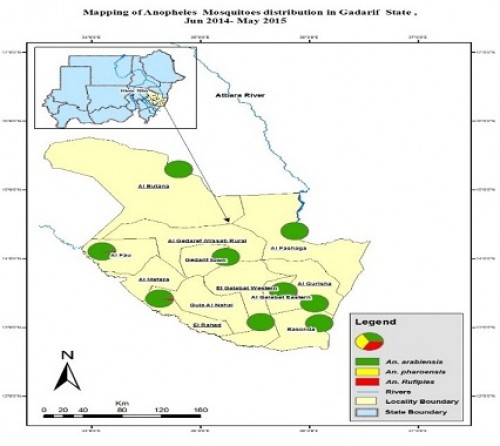Mapping of Anopheles mosquitoes (Diptera: Culicidae) in Gedarif State, Eastern Sudan
Author(s): Mohammed YI Cobani, Nabil HH Bashir and Samira H AbdElrahman
Abstract: Anopheline mosquitoes (Diptera: Culicidae) consist of a large number of species. The distribution (mapping) of malaria vector is important for strategic planning and disease control strategies. This cross -sectional study was conducted in Gedarif state (14-16 N and 33-36 E longitude; 75,000 km², 1.8 million people), eastern Sudan, to identify Anopheline species and their breeding sites and habitats as part of a national mapping project. Mosquitoes were collected in the dry- and rainy- season, starting June 2014 to May 2015. Larvae were collected from the breeding sites by dipping and netting techniques. Adults were collected by aspirators, pyrethroids spray catches and Center for Disease Control (CDC) light traps from 9 stations. Morphological identification of adult specimens showed the presence of A. arabiensis (98.5%), A. rufipes (1.0%) and A. pharoensis (0.5%). A. arabiensis is the only member of A. gambiae complex predominant in all localities, co-existing with the other two species. Mapping of these vectors in all states must be a yearly task to assist in planning and decision-making.
 Fig.:
Fig.: Map by GIS for Gedarif State showing the sentinel sites and
Anopheles species distribution in the state
How to cite this article:
Mohammed YI Cobani, Nabil HH Bashir, Samira H AbdElrahman. Mapping of Anopheles mosquitoes (Diptera: Culicidae) in Gedarif State, Eastern Sudan. Int J Mosq Res 2017;4(1):28-32.



